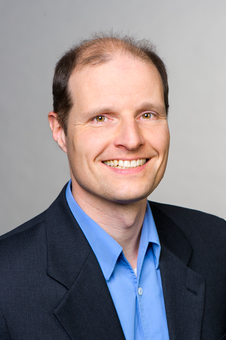Ulrich Gerland appointed as Full Professor for “Theory of complex biosystems”
2014-05-22 – News from Physik-Department
Ulrich Gerland is appointed as Full Professor at Physik-Department. He succeeds Roland Netz, leading the reoriented chair for “Theory of complex biosystems”.

Professor Ulrich Gerland’s research focusses on understanding the physics of biological function in experimentally well-studied systems. He will further expand the expertise of the group by establishing an experimental lab to quantitatively analyze regulatory dynamics in bacteria, complementing some of the theoretical work of the group.
Research at Gerland’s new chair
In physics, interactions between particles follow laws. In biology, interactions between biomolecules serve a function. These very different viewpoints are beginning to merge: research over the past years has demonstrated how, in some exemplary cases, the laws of physics constrain the implementations of biological functions.
The Gerland group investigates several such cases. For instance, the group studies how the spatial arrangement and coordination of enzymes determines the efficiency of a multi-step reaction. These spatial arrangements can be natural (as in biomolecular complexes) or engineered with modern methods of bio-nanotechnology. In both cases, fundamental functional tradeoffs emerge, which must be characterized to understand the optimization of such systems.
Methods from theoretical physics help to describe the functioning of these complex biomolecular systems on a quantitative level, while the biological function leads to new questions, with many parallels in the engineering disciplines. Seen from this perspective, a bacterium is a microscopic bioreactor programmed by evolution to rebuild itself from a variable set of resources and in fluctuating environments.
How is this bioreactor programmed? Which strategies enable the control of a diverse set of physico-chemical processes in a way as to robustly produce a highly complex product? Quantitative analysis and modeling of such systems permits the Gerland group to gain insight into the underlying design principles.
Biography of Ulrich Gerland
Ulrich Gerland was born in 1970 and studied Physics at the Universities of Dortmund and Heidelberg. His PhD work, performed in Heidelberg and Paris, as well as a short Postdoc in Karlsruhe was in the field of Quantum Chaos and Mesoscopic Solid State Physics.
He then moved his research focus into Theoretical Biological Physics with an extended Postdoc at the University of California at San Diego in the group of Professor Terence Hwa, a leading researcher in this growing field. In 2003, the German Research Foundation awarded him an Emmy Noether Research Grant, which he used to establish a Junior research group at the LMU Munich.
He obtained his first faculty appointment in 2006 at the University of Cologne and then moved to the LMU Munich in 2008, where he became part of the shared LMU-TUM Excellence Cluster Nanosystems Initiative Munich (NIM), the Center for NanoScience (CeNS), and the Graduate School of Quantitative Biosciences Munich (QBM). In 2012, he was awarded a grant from the BioSysNet Center of the Bavarian State to study the “Physical biology of nucleosome positioning, remodeling, and transcription regulation in yeast”.
- Editing
- Dr. Johannes Wiedersich
Contact
- Prof. Dr. Ulrich Gerland
- Full Professorship Theoretische Physik – Theorie komplexer Biosysteme Physik-Department Technische Universität München James-Franck-Str. 1 85748 Garching Tel.: +49 89 289 12394 Fax: +49 89 289 14656 Email: gerland@tum.de
Links
- Personal web page of Prof. Dr. Ulrich Gerland
- Ulrich Gerland’s research group Theory of complex biosystems